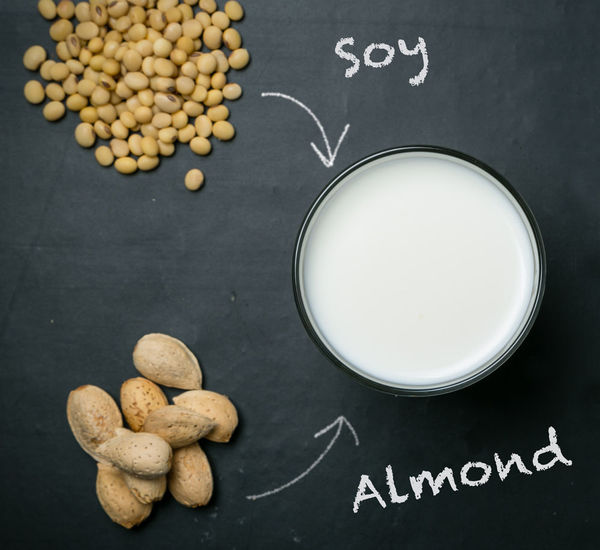
November is Vegan Awareness Month and so it might be timely to discuss milk alternatives carried in the dining halls. Veganism is one reason a person might seek a dairy milk alternative, but other reasons include a milk allergy, lactose intolerance, and potential health concerns (antibiotics, pesticides, and hormones).
Nutritionally speaking, cow’s milk has an impressive nutrient profile. It is rich in protein, provides a solid mix of leader nutrients such as calcium, magnesium, potassium, riboflavin, folate, and vitamin B12, and is fortified with vitamin D (the sunshine vitamin). The question then becomes what milk alternative(s) compares or comes closest to the nutritional value of dairy? The two most popular alternatives are soy and almond and also happen to be the ones available at North and South Dining Halls.
For comparison’s sake, lower fat dairy milk has approximately 100 calories and 8 grams of protein per cup. Soy milk comes closest to matching that at approximately 95 calories and 7 to 12 grams of protein per cup. Almond milk comes in the lowest in the way of calories (30 to 50), but also in protein at only 1 gram per cup. Soy milk also contains phytonutrients known as isoflavones, which have been shown to have cancer-fighting properties. Soy milk provides a source for heart healthy polyunsaturated fat. Almond milk, on the other hand, is a good source of heart healthy monounsaturated fats and vitamins A and E. As listed above, calories are the lowest, but with fewer calories comes fewer nutrients. A recent paper published in the Journal of Food Science and Technology looked at this very subject and concluded “it is quite clear that nutritionally, soy milk is the best alternative for replacing cow’s milk in the human diet”. However, they acknowledge that more people prefer the flavor of almond milk over soy milk.
Ultimately, it comes down to personal preference and balance. Both milks are usually fortified with calcium and vitamin D. They are both also available sweetened or unsweetened—and while they aren’t quite the heavy hitters in terms of the nutritional package provided in cow’s milk, they can be great substitutes as long as you read labels and seek out other foods for those nutrients that fall short.
Source: Vanga, S. K., & Raghavan, V. (2017). How well do plant based alternatives fare nutritionally compared to cow’s milk? Journal of Food Science and Technology,55(1), 10-20. doi:10.1007/s13197-017-2915-y